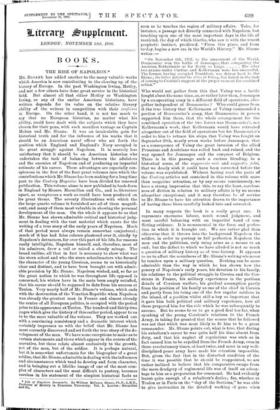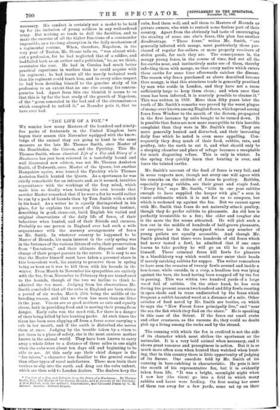BOOKS.
THE RISE OF NAPOLEON.*
MR. SLOANE has added another to the many valuable works which America is now contributing to the clearing up of the history of Europe. In the past Washington Irving, Motley, and not a few others have done great service in the historical field. But almost all that either Motley or Washington Irving, or any of the earlier American historians, have written depends for its value on the relative literary ability of the writers in competition with their confrres in Europe. On the other hand, it is not too much to say that no European historian, no matter what his ability, could have dealt with the subjects which they have chosen for their pens, with such manifest vantage as Captain Mahan and Mr. Sloane. It was an incalculable gain for historical truth and for the influence of his works that it should be an American naval officer who set forth the position which England and England's Navy occupied in the great struggle against Napoleon. It is scarcely less satisfactory that it should be an American historian who undertakes the task of balancing between the adulators and the enemies of Napoleon and of producing an impartial estimate of his career. These advantages are especially con- spicuous in the first of the four great volumes into which the contributions which Mr. Sloane has been making for a long time past to the Century Magazine have been divided for renewed publication. This volume alone is now published in book-form in England by Messrs. Macmillan and Co., and is, literature apart, as sumptuous a work as could have been produced on its great theme. The seventy illustrations with which the the large quarto volume is furnished are all of them magnifi- cent, and many of them most valuable in showing the personal development of the man. On the whole it appears to us that Mr. Sloane has shown admirable critical and historical judg- ment in dealing with the vast material which exists for the writing of a true story of the early years of Napoleon. Much of that period must always remain somewhat conjectural ; much of it has had false colours plastered over it, chiefly by Napoleon's detractors, for over this part of his life, for reasons easily intelligible, Napoleon himself, and, therefore, most of his admirers, drew a veil or raised a cloudy mirage. The broad outline, all that in fact is necessary to show what was the stern school and who the stern schoolmasters who formed the character of the young Corsican, seems to us historically clear and distinct, and to have been brought out with admir- able precision by Mr. Sloane. Napoleon wished, and, so far as the great nation to which he was throughout life opposed is concerned, his wishes have in the main been amply satisfied, that his career should be supposed to date from his success at Toulon. Very nearly half of Mr. Sloane's volume, which ends with the destruction of the Venetian Republic when Napoleon was already the greatest man in France and almost already the centre of all European politics, is occupied with the period prior to his appearance at Toulon. The hundred and thirty-two pages which give the history of this earlier period, appear to us to be the most valuable of the volume. They are worked out with a convincing consistency and a dramatic interest which certainly impresses us with the belief that Mr. Sloane has most correctly discovered and set forth the true story of the de- velopment of the man. We have some exceptions to make as to certain statements and views which appear in the course of the narrative, but these relate almost exclusively to the growth, not of the man, but of the soldier. It is perhaps natural, but it is somewhat unfortunate for the biographer of a great soldier, thatMr. Sloane, admirable in dealing with the influences and circumstances which tend to develop and form character, and in bringing out a lifelike image of one of the most com- plex of characters and the most difficult to portray, becomes careless in his statement of the simplest historical facts as Life of Napoleon. Bonaparte. By William Millegan Sloane, Ph.D., L.H.D.,
Professor of History in Princeton University. Vol. I. London : Macmillan and ON
soon as he touches the region of military affairs. Take, for instance, a passage not directly connected with Napoleon, but touching upon one of the most important days in the life of mankind, the day of which Goethe, who saw it with the truest prophetic instinct, predicted, "From this place, and from to-day, begins a new era in the World's History." Mr. Sloane writes :-
" On November Gth, 1792, to the amazement of the World, Doumouriez won the battle of Jemmapes, thus conquering the Austrian Netherlands as far North as Liege The other two armies under Custine and Kellermann were less successful. The former, having occupied Frankfort, was driven back to the Rhine ; the latter defeated the allies at Valmy, but failed in the task of coming to Custine's support at the proper moment for combined action."
Who would not gather from this that Valmy was a battle fought about the same time, as, or rather later than, Jemmapes by a co-operating army in a different field of operations, alto- gether independent of Doumouriez ? Who could guess from it the true history that Kellermann at Valmy commanded a portion of Doumouriez's army, that Doumouriez in person supported him there, that the whole arrangement for the combined operation of the two forces was Doumouriez's, not Kellermann's work, that Kellermann would have retreated altogether out of the field of operations but for Doumouriez's order to him to retrace his steps, that Valmy was fought on September 20th, nearly seven weeks before Jemmapes, that as a consequence of Valmy the great invasion of the allied Prussians and Austrians was rolled back and ruined, and the way opened for Jemmapes and the conquest of Belgium. There is in this passage such a curious blending, in a historical sense, of the suppressio veri and suggestio fulsi, that we dearly wish it could have been corrected before the volume was republished. Without having read the parts of the Century articles not contained in this volume with more than magazine attention, or by any means continuously, we have a strong impression that this, to say the least, careless- ness of diction in relation to military affairs is by no means altogether exceptional, and it may therefore be of service to Mr. Sloane to have his attention drawn to the importance of having these blots carefully looked into and corrected.
In many respects the book is a really great one. It represents enormous labour, much sound judgment, and most careful balancing with an impartial hand of con- flicting evidence. It is monumental in the form and perfec- tion in which it is brought out. We are rather glad than otherwise that it throws into the background Napoleon the soldier, in order to portray in full perfection Napoleon the man and the politician, only using arms as a means to an end ; but the defect to which we have alluded is not so much a question of military history as of true history. It appears to us to affect the soundness of Mr. Sloane's writing whenever he touches upon a military question. Nothing can be more admirable than the way in which he has shown how the penury of Napoleon's early years, his devotion to his family, his relations to the political struggle in Corsica and the Cor- sicans in France, his military experiences in the partisan details of Corsican warfare, his gradual assumption partly from the position of his family as one of the chief in Corsica and partly from his being one of the few regular soldiers in the island, of a position whilst still a boy so important that it gave him both political and military experience, how all these prepared him for the role which he was subsequently to assume. But he seems to us to go a good deal too far, when speaking of the young Corsican's relations to the French Army, in taking for granted that the coarse that he followed was not that which was most likely to fit him to be a great commander. Mr. Sloane points out, what is true, that during his subaltern's career he was quite half his time absent from duty, and that his neglect of regulations was such as in fact caused him to be expelled from the French Army, even in those revolutionary times, at least twice, and must in any well- disciplined peace army have made his retention impossible. But, given the fact that in the disturbed condition of the time it was possible that he should be reappointed, we are rather inclined to believe that his comparative escape from the mere drudgery of regimental life was of itself an advan- tage to him as a preparation for command. He had evidently learnt quite enough of a subaltern's duties; for, whether at Toulon or in Paris on the " day of the Sections," he was able to give instruction in the detailed working of guns when necessary. His conduct is certainly not a model to be held up for the imitation of young soldiers in any well-ordered army. But nothing so tends to dull the faculties, and to make the exercise of all the higher functions of a commander impossible, as a too-long absorption in the daily mechanism of a regimental routine. When, therefore, Napoleon, in the very year of Toulon, Mr. Sloane tells us, "was almost with- out a profession, for he had neglected that of a soldier, and had failed both as an author and a politician," he, as we think, overstates the case. He had in Corsica had much better practical experience in warfare than he could acquire with his regiment ; he had learnt all the merely technical work that his regiment could teach him, and in every other respect he had been devoting himself to the genuine study of his profession to an extent that no one else among his contem- poraries had. Apart from this one blemish it seems to us that this is by far the best study of the growth of Napoleon, of the "germ concealed in the bud and of the circumstances which conspired to unfold it," as Neander puts it, that we have ever had.























































 Previous page
Previous page